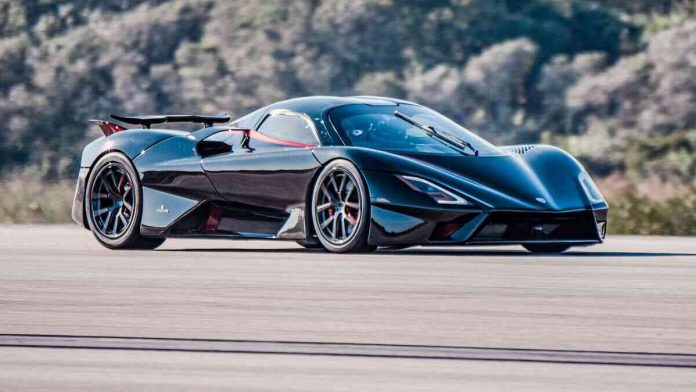Speed is a symbol of automotive excellence—a showcase of engineering, innovation, and extreme performance on public roads. In 2025, for a lot of people, the battle for the crown of “world’s fastest production car” continues, with manufacturers pushing boundaries across combustion and electric powertrains. Below, we explore the top contenders, verified records, and emerging challengers in this high-stakes race.
Table of Contents
Top Production Speed Records
SSC Tuatara – 474 km/h (≈ 295 mph) (Verified)
The SSC Tuatara, built by SSC North America, currently holds the highest verified two-way average speed for a production car. In a carefully documented run, it hit 474.8 km/h (≈295 mph) with its twin-turbo V8 generating 1,750 hp. Earlier disputed claims had it topping 532 km/h, but independent testing later confirmed the more conservative figure .
Hypercar Threats: Claimed Highest Speeds
Koenigsegg Jesko Absolut – Theoretical 531–500 km/h (≈330–310 mph)
Koenigsegg’s Jesko Absolut is engineered with one goal: breaking speed records and potentially setting new world records. Its low-drag body and powerful 1,600 hp twin‑turbo V8 theoretically support speeds up to 531 km/h (≈330 mph). Real-world runs have yet to confirm this, but the car’s advanced aerodynamics and simulations place it at the pinnacle of potential official top speed capabilities, with a caveat regarding the achievement of such figures in practice.
Hennessey Venom F5 – Claimed 500 km/h (≈311 mph)
The U.S.-built Hennessey Venom F5 boasts a 6.6-liter twin-turbo V8 pumping out 1,817 hp. Its makers claim a top speed of 500 km/h (≈311 mph). Though official testing toward this goal is ongoing, it remains a formidable challenger in the hypercar realm.
Established Legends
Bugatti Chiron Super Sport 300+ – 490 km/h (≈304 mph)
Bugatti made history in 2019 when the Chiron Super Sport 300+ became the first production car to exceed 300 mph, recording 490.48 km/h on Germany’s Ehra-Lessien track. While the run was one-way and electronically limited to lower speeds on the road, it remains a milestone in automotive achievement.
Electric Revolutionaries
Rimac Nevera – Verified 412 km/h (≈256 mph)
This Croatian electric hypercar, with four electric motors delivering a collective 1,914 hp, is currently the fastest production EV. It has been verified at 412 km/h (≈256 mph), proving electric drivetrains can rival their combustion counterparts on top speed.
Aspark Owl – Claimed 438 km/h (≈273 mph)
Japan’s Aspark claimed its Owl SP600 hit 438 km/h during testing. This all-electric hypercar is also renowned as the fastest accelerating production vehicle—0–100 km/h in under 1.9 seconds.
Fastest Cars Available to Buy (Mainstream or More Accessible High-Speed Cars)
For speed enthusiasts who are keen to experience high performance without the ultra-exclusive price tags, several mainstream cars on the market today offer thrilling speed and advanced technology. One standout contender is the Ford Mustang Shelby GT500, boasting a supercharged 5.2-liter V8 engine that churns out an impressive 760 hp, allowing it to sprint from 0 to 60 mph in just 3.3 seconds. Another impressive option is the Chevrolet Corvette Stingray, equipped with a naturally aspirated 6.2-liter V8 capable of reaching a top speed of around 194 mph—an astonishing figure for a vehicle starting at a relatively affordable price. Not to be overlooked, the Tesla Model S Plaid, with its tri-motor all-wheel-drive system, claims to accelerate from 0 to 60 mph in under 2 seconds, showcasing that electric can indeed compete with traditional powerhouse performance. These cars highlight the industry’s focus on making exhilarating speed accessible to more drivers, blending cutting-edge engineering with everyday usability for those seeking a taste of the fast lane.
Summary Comparison
Car | Powertrain | Top Speed | Status
SSC Tuatara | V8 ICE | 474 km/h (verified) | Fastest verified production car – holds a record in the Guinness Book of Records
Bugatti Chiron Super Sport | W16 ICE | 490 km/h (one-way run) | First to 300 mph barrier
Koenigsegg Jesko Absolut | V8 ICE | Theoretical ~531 km/h | Record contender
Hennessey Venom F5 | V8 ICE | Claimed 500 km/h | Ongoing high-speed goals
Rimac Nevera | Electric | 412 km/h (verified) | Fastest EV
Aspark Owl SP600 | Electric | Claimed 438 km/h | Fastest accelerating EV
Verdict: Who’s No. 1?
- Currently fastest production car (verified): SSC Tuatara at 474 km/h.
- First to break 300 mph: Bugatti Chiron Super Sport 300+.
- Theoretical top-spot contender: Koenigsegg Jesko Absolut, with claims of 531 km/h.
- Fastest electric: Rimac Nevera (412 km/h).
Why These Speeds Matter
- Engineering Superiority: Hitting extreme speeds requires innovations in aerodynamics, materials (e.g., carbon fiber), and powertrain engineering.
- Extreme Validation: Success in top-speed tests showcases reliability under extreme stress.
- Tech Transfer: Developments often trickle down into mainstream automotive safety and efficiency improvements.
What’s Next?
The race continues with hypercars and supercars like the Venom F5, built by John Hennessey in Florida, USA, and Jesko Absolut pursuing verified records, reminiscent of legendary events such as Le Mans. As electric hypercars evolve, we may soon see EVs challenging combustion titans at the top. Tire and track technologies, as well as global regulations, will shape these future pursuits.
Final Thoughts
While the SSC Ultimate Aero TT and the SSC Tuatara presently hold the production car speed record, the Koenigsegg Jesko Absolut may soon rewrite history. With EVs like Rimac’s Nevera and Aspark’s Owl challenging with electric power, the top-speed crown could see an electric shift in the near future.
Whether fueled by gasoline or electricity, the motorsport spirit lives on—challenging limits, proving innovation, and thrilling speed enthusiasts worldwide.

